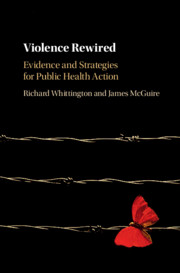‘Violence Rewired is ground-breaking for its scope and rigour that takes us on a journey from our primate past to a potentially peaceful future. It dispels myths around our ‘true nature' in a convincingly scientific and scholarly way that suits audiences ranging from nurses, judicial scholars, students to the scientifically curious.'
Devon Polaschek - Joint Director of the New Zealand Institute for Security and Crime Science, University of Waikato, New Zealand
‘This book offers one of the most sensible and useful accounts of human violence to date. In familiar and concise prose, Violence Rewired provides readers with a comprehensive overview drawing on archaeology, biology, and psychology. The authors enlighten with state-of-the-art scientific literature on the effectiveness of global efforts to reduce violent behavior.'
Birgit Völlm - Medical Director of the Forensic-Psychiatric Hospital, University of Rostock, Germany
‘The editors have conquered the complex challenge of comprehensively integrating biological, psychological, and social approaches to understanding violence. Their work presents a positive message: violent behaviour can be changed. This will be a big hit and eminent milestone for researchers in the field.'
Tilman Steinert - Medical and Research Director of the Clinic for Psychiatry and Psychotherapy, Ulm University, Germany
‘This outstanding book provides a comprehensive overview of theories and relevant research results on violence from various scientific disciplines. Moreover, it supplies optimism and greater confidence about possibilities of effectively intervening with violent people. In short, it is a must-read for those who want to gain the best possible grasp of (preventing) violence.'
Vivienne de Vogel - University of Applied Sciences Utrecht, and Researcher, De Forensische Zorgspecialisten, The Netherlands
‘It is a pleasure to welcome this book, which describes public health approaches to understanding and preventing violence. It includes wide-ranging reviews of biological, psychological and social factors, risk assessment instruments, and different types of interventions. This book will be of great interest to biologists, psychologists, social scientists, and anyone who is interested in understanding and preventing violence.'
David P. Farrington - Emeritus Professor of Psychological Criminology, University of Cambridge



